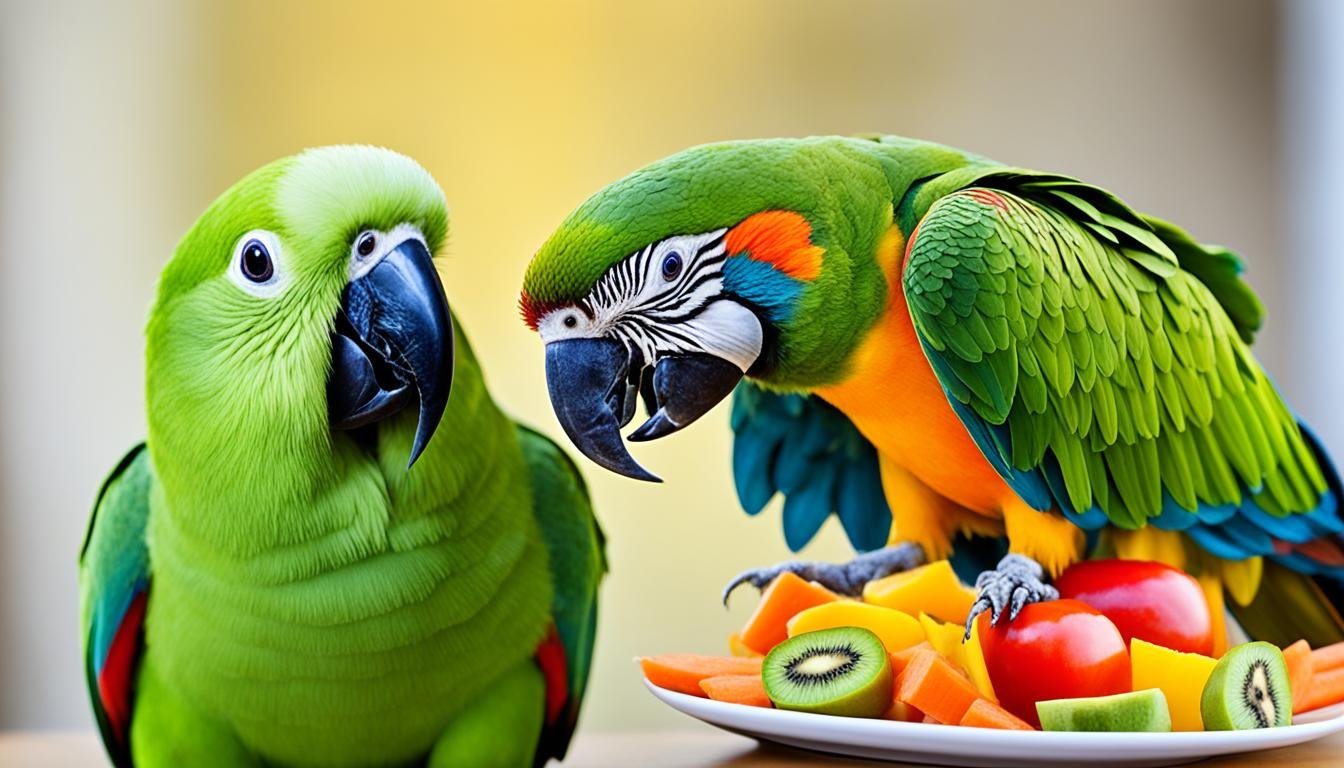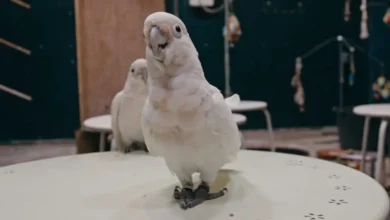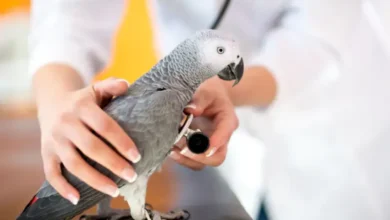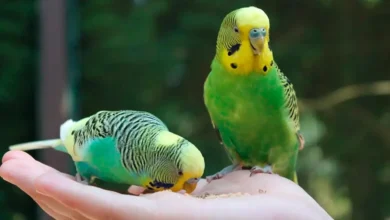What Do Parrots Eat? A Guide to Parrot Nutrition
Parrots are a favorite pet in the UK, after dogs, cats, and rabbits. They bring joy and beauty to many homes. But, it’s important to know what they need to eat to stay healthy.
What exactly do parrots eat? Many parrots get sick because they don’t get the right nutrients. This guide will cover the diet of parrots, from wild ones to pets. We’ll look at what they naturally eat and what’s best for your parrot to stay healthy.
Parrot Nutrition in the Wild
In the wild, parrots eat a wide variety of foods. They are great at finding seeds, nuts, fruits, veggies, and even insects. This helps them get the vitamins and minerals they need to stay healthy and full of energy.
Wild parrots fly a lot to find food and make nests. So, they need more food than birds kept as pets. Knowing what wild parrots eat can help us pick the best food for our pets. This makes sure they get a diet that’s good for them.
Foraging for a Bewildering Array of Foods
Wild parrots eat many things, including:
- Seeds: Sunflower, millet, barley, pumpkin, corn, and sorghum
- Nuts: Hazelnuts, cashews, almonds, pistachios, macadamias, and walnuts
- Fruits: Wild berries and figs
- Flowers: Daisies, chamomile, hibiscus, roses, and jasmine
- Insects: Earthworms, termites, caterpillars, and mealworms
Seeds and nuts are key foods for wild parrots because they’re full of nutrients. They also love eating wild berries and figs. Plus, they enjoy eating certain flowers that are safe for them.
Parrots in the wild forage for a variety of foods. This gives them a diet full of vitamins, minerals, and other important nutrients. This info can help us choose the right foods for our pet parrots. It ensures they get a diet that’s good for them.
Balanced Diet for Companion Parrots
We can’t exactly mimic a wild parrot’s diet, but we can draw inspiration from it. A varied diet with fresh fruits, veggies, protein, and treats is key. This ensures our parrots get the vitamins and minerals they need for good health.
Proper nutrition is crucial for parrots. It affects their feathers, energy, and brain function. A balanced diet keeps them happy and healthy.
Each parrot type has its own dietary needs. Seed diets are not enough and can cause health issues. Macaws need big nuts, while smaller parrots do well with seed mixes and dried fruits.
| Food Type | Percentage in Parrot Diet |
|---|---|
| Vegetables | 60-80% |
| Fruits | 20-40% |
| Protein Sources | 5-10% |
| Grains and Carbohydrates | 5-10% |
Offering a mix of fresh fruits and veggies is good for parrots. Some like big pieces, others like them chopped. They enjoy foraging and eating together.
Pellets are important for parrots, filling any nutritional gaps. It’s important to feed them in moderation. This ensures they get all the nutrients without eating too much.
Using resources like the Natural Feeding System: Cooking For Parrots cookbook helps. It guides you in feeding your parrot a healthy diet.
What do Parrots Eat?
Fresh Fruits and Vegetables
Parrots do well with a diet full of fresh fruits and vegetables. These foods are key for their health and happiness. They love leafy greens like spinach, kale, and romaine lettuce. Also, they enjoy bell peppers, broccoli, carrots, sweet potatoes, and berries.
These foods are packed with vitamins, minerals, and antioxidants. They keep your parrot healthy. Parrots also like the tough texture of some veggies, which helps their beaks grow.
When adding new foods, start with a little and watch how they react.
- Leafy greens (spinach, kale, romaine lettuce)
- Bell peppers
- Broccoli
- Carrots
- Sweet potatoes
- Berries
Offering a mix of fresh fruits and veggies makes sure your parrot gets all the nutrients they need. This keeps them healthy and full of energy.
Pellets and Seed Mixes
Feeding your parrot a balanced diet is key. High-quality parrot pellets should be the main part of their daily food. These pellets are made to give your parrot all the vitamins, minerals, and nutrients it needs.
Parrot seed mixes are often too fatty and lack important nutrients. They should be a small part of what you feed your parrot. Always pick a pellet or seed mix made for your parrot’s type, as their needs differ.
- Pellets should make up 60% of a parrot’s diet for complete nutrition.
- Parrot seed mixes should only be 20% of the diet, as they are often high in fat and low in other essential nutrients.
- Fresh fruits and vegetables should also be 20% of a parrot’s diet for a balanced parrot nutrition.
Even though parrot pellets are best, some birds might not like them at first. Try different brands and types to find what your parrot prefers. It’s important to mix pellets, seed mixes, and fresh produce for a balanced diet.
Protein Sources and Sprouts
Parrots need a mix of pellets, fresh fruits, and vegetables, plus protein sources and sprouts for good health. It’s important to give them different protein-rich foods. These help with muscle growth and feather development.
Great protein sources include cooked beans, lentils, and legumes, along with lean meats or eggs. Always cook and cool these foods before giving them to your parrot. Start with small amounts and watch how they react to new foods.
Sprouted seeds and grains are also great for parrots. They’re full of parrot protein and other nutrients. Sprouts are super nutritious and are like a fresh, growing plant for your parrot.
It’s easy and cheap to grow your own parrot sprouts. Just soak the seeds or mix for 8-12 hours, then let them sprout for 4-5 days. You can use an Easy Sprout sprouter for under $15 or make it fun by getting your kids involved.
Feeding your parrot a balanced diet with parrot protein sources and parrot sprouts is key for their health. These foods help with growth, development, and keeping your parrot happy and healthy.
| Protein Source | Benefits for Parrots |
|---|---|
| Cooked Beans, Lentils, and Legumes | Provide complete protein, fiber, and essential vitamins and minerals |
| Lean Meats and Eggs | Offer high-quality protein and other nutrients in moderation |
| Sprouted Seeds and Grains | Enhance nutritional profile and serve as a living, whole-food protein source |
Chewing and Foraging Opportunities
Parrots love to chew and forage, which are key to their well-being. It’s important to give them things to chew on and forage for. This keeps them happy and healthy.
Give your parrot safe branches to chew on. Hide treats in puzzle toys or around their home. Nuts are great too, but don’t give them too many because they’re high in fat.
Orange Winged Amazons spend up to eighteen hours a day foraging in the wild. In cages, they might eat for just thirty minutes. It’s better for them to forage than eat from a bowl. So, make sure they have foraging chances to stay healthy.
Start by using more than one bowl for your parrot. You can also buy special foraging toys. Or, use things you have at home like paper bags or cardboard boxes to hide treats.
Chewing and foraging help prevent bad behaviors. They keep your parrot busy, healthy, and happy.
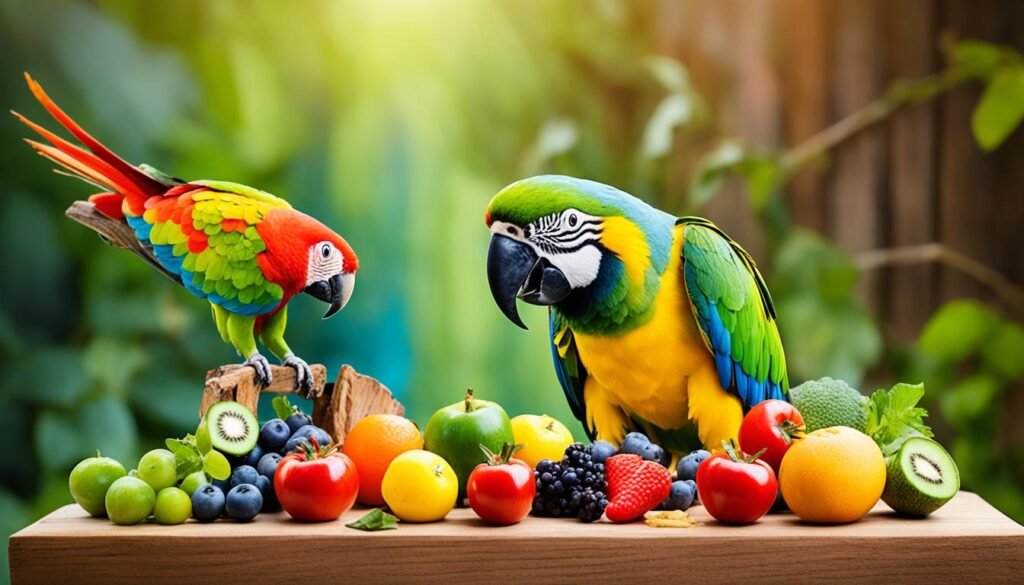
There are many ways to give your parrot foraging chances, from simple in-cage tricks to big setups outside the cage. The main thing is to keep them busy chewing and foraging. This keeps their mind and body active.
Species-Specific Dietary Needs
Lories, Lorikeets, and Grass Parakeets
Every parrot species has its own diet needs. Lories and lorikeets love nectar and pollen. They should eat a lot of lories diet, veggies, and nectar or pollen supplements. Grass parakeets like to eat seeds and grasses. They do well with many small meals a day to mimic their natural eating habits.
It’s important to know what your lorikeets diet parrot needs to eat. Birds often get sick from not eating right. So, giving them the right food is key to their health.
Wild parrots eat many different foods every day. They eat fruits, nuts, flowers, greens, seeds, and grasses. It’s hard to give birds the right mix of food at home, but it’s crucial for their health.
Knowing what each parrot species needs to eat helps pet owners feed them right. This can stop problems like feather discoloration, changes in droppings, weight changes, depression, and poor eating habits from happening.
Foods to Avoid
Parrots love to eat, but some foods are bad for them. These include avocado, rhubarb, onions, garlic, mushrooms, asparagus, chocolate, and foods high in fat, sugar, or salt. Dairy can also be fattening and should be given in small amounts. And, alcohol and sugary drinks are a big no-no.
Always check if a new food is safe for your parrot before giving it to them. If you’re unsure, talk to an avian vet. The wrong foods can make your bird very sick, so watch what you feed them closely.
Toxic and Harmful Foods
- Avocado can harm a bird’s heart, make breathing hard, cause weakness, and even lead to death. Different birds react differently to avocados.
- Caffeine can make a bird’s heart race, cause trouble breathing, be too active, and even stop the heart in birds.
- Chocolate is bad for birds, even a little bit. It can make them vomit, have diarrhea, be too active, shake, have seizures, and even die.
- Too much salt can mess up a bird’s electrolytes, cause dehydration, kidney failure, and death. So, don’t give them too many salty treats.
- High-fat foods can make birds have high cholesterol and triglycerides, heart disease, and get obese. This is especially true for Amazon and Quaker parrots.
- Fruit pits and apple seeds have cyanide in them, which is bad for birds. Make sure to take them out before giving the fruit to your bird.
- Onions and garlic are good for people but not for birds. They can cause stomach ulcers, anemia, and weakness in birds because of the sulfur and allicin in them.
- Xylitol, found in sugar-free gum, can make birds have low blood sugar, liver damage, and even die. This is because birds have a sensitive metabolism.
There are many foods you should not give to parrots. Always make sure a new food is safe before giving it to your bird. It’s a good idea to talk to an avian vet to make sure your parrot is eating right.
Presentation and Enrichment
The way you serve your parrot’s food can really affect their appetite and how much they enjoy eating. Try different ways to serve food, like hanging it on the cage wire or spreading it around their home. This encourages them to forage like they would in the wild.
Using foraging toys or puzzle feeders can also make eating more fun and challenging for your parrot. It’s a great way to keep their mind active during meals.
Remember, parrots like different foods at different times of the year. So, change how you present their food to match their changing tastes. This helps make sure they get the nutrients they need and enjoy their meals more. Studies show that parrots in interesting environments are less likely to damage their feathers.
Adding parrot diet enrichment strategies, like giving them lots of foraging chances and changing toys often, can really help your parrot. It makes their meals more exciting and supports their health and happiness. By meeting their natural foraging needs and making meals fun, your parrot will do well in both body and mind.

